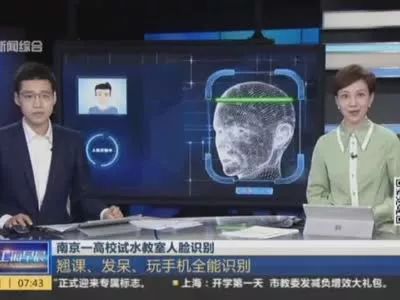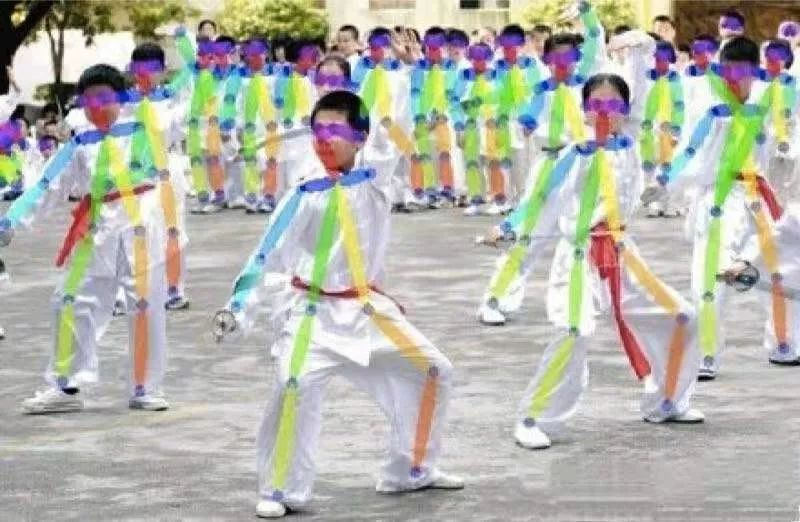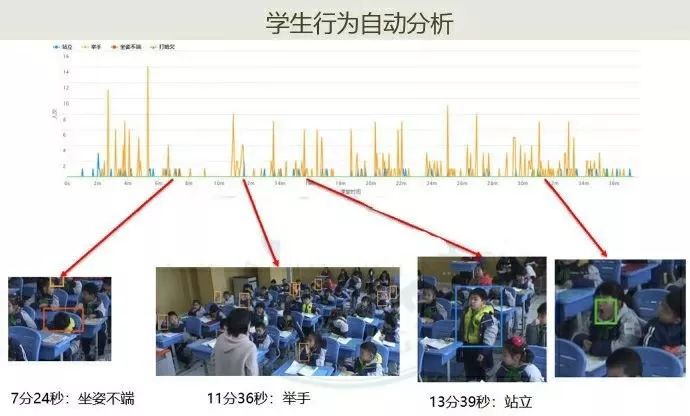Campus version of “The World of Truman”?
Editor’s note: This article is from WeChat public account “New Witness” (ID: AI_era), edit Zhang Jia, Daming.
Recently, China Pharmaceutical University piloted the face recognition system in the classroom. In addition to automatically recognizing the student’s attendance, it also enables full monitoring of the student’s classroom attendance. . The school believes that this is to urge the study, but the netizens do not buy it. What do you think?
When I was in school, I was afraid of the teacher’s eyes, and now the face recognition classroom is coming.
Recently, the China Pharmaceutical University in Nanjing, Jiangsu Province has been pushed to the forefront of public opinion because of the use of face recognition systems in the classroom.
The absenteeism and the use of mobile phones can’t escape its “eyes”, and Nanjing University tests the “face recognition classroom”
It is reported that the face recognition system installed by the China Pharmaceutical University in two classrooms can not only automatically identify the student’s attendance, but also realize the whole process of monitoring the classroom listening situation.
Does the students listen carefully, whether they are looking down in the classroom, looking down a few times, looking up for a long time, whether they are playing with their mobile phones, whether they are closing their eyes or not sleeping… they can’t escape this face recognition system. Eye of the law.”
Xu Jianzhen, director of the Library and Information Center of China Pharmaceutical University, said: Traditional name wasting time and accuracy is not high, but face recognition is no problem.
It is reported that this is a request of the school’s administrative department, which is intended to reduce students’ skipping classes, leaving early, spending money to find people to take classes, and not listening carefully in class, to improve student attendance and serious classroom discipline.
However, some students believe that doing so would infringe on personal privacy.
“In order to (urging) you to study, you still complain, are you still a student?” Xu Jianzhen said that the school had previously consulted the public security department and the legal department for the idea that the face recognition system in the classroom violated the privacy of students. Strong>Because the classroom is a public place, there is no such thing as “infringement of privacy”.
In addition to the classroom, China Pharmaceutical University has installed face recognition access control at the entrance of the school, the entrance of the student dormitory, the library, and the laboratory building.
The face recognition classroom triggered a hot discussion among Weibo users. Most netizens expressed opposition and believed that this violated the privacy of students, but some people expressed support.
This student said that he did not feel privacy violations
This netizen thinks that brushing in and out is relatively safe and good for students
This drug college student thinks that there is nothing, it is convenient to brush his face into the door. The face recognition classroom is only one or two in trial, and it is not said to be loaded.
Children’s smiles must be monitored? Shanghai Elementary School uses AI to evaluate students’ classes
Installing a camera in a classroom is nothing new, but the use of face recognition technology in the classroom to analyze student attendance has only recently begun.
Last month, Minhang Primary School, affiliated to Shanghai University of Traditional Chinese Medicine, brought face recognition to the campus, through the three sets of “AI+School” systems, including intelligent classroom evaluation system, intelligent environment analysis and control system and intelligent teacher training system. Students and teachers are monitored. This move also caused a lot of controversy.
According to the propaganda, the “intelligent classroom evaluation system” that enters the classroom can automatically detect the behaviors and emotions of teachers and students on the basis of the sample data of real classrooms, and give an evaluation based on classroom performance through intelligent algorithm analysis. And suggestions for improvement.
For students, the system can automatically detect the behavior of students raising their hands, standing, sitting, etc., and form an overall evaluation of the classroom effect through record analysis. It can be said that the “face recognition classroom” used by Nanjing universities has the same meaning.
It is reported that after using this system, whether the students have a smile in their daily life, whether they say hello to the teacher, whether they are taking the initiative to pick up the garbage, whether the queue is neat, etc. will be captured by the AI and fed back to the master control. Center.
According to the report of China News Weekly, Ms. He, a parent of a second-grade elementary school student in Shanghai, immediately heard the news and immediately called the relevant department to inquire. She believed that AI must enter the primary school and must inform the parents and need parents. The joint name agrees, “If there is a parent objection, the school should not implement it.” She believes that “to the school to install AI, parents mustMust be signed.
However, some people expressed support because it can prevent dangers, reduce campus bullying, and improve teaching quality.
A Swedish high school uses face recognition to monitor student attendance and is accused of penalizing a violation of the privacy law of 150,000
Face recognition into the classroom is not unique to China. Recently, a high school in Sweden used face recognition to monitor student attendance and was fined 200,000 Swedish kronor. This case sparked a discussion about the further application of AI technology in educational institutions.
A local educational institution in Skellefteå, a northern Swedish city, was fined by the Swedish Data Protection Agency at a rate of 200,000 Swedish kronor (about RMB 150,000) because the school used facial recognition technology. Monitor the attendance of high school students.
In the school’s experimental program, the attendance of 22 students was tracked and monitored over a three-week period, and each of these students recorded facial information each time they entered the classroom.
Before this test was conducted, the students and their parents were actually licensed. However, the Swedish Data Protection Agency (DPA) concluded that the program still violates certain provisions of the EU privacy regulations General Data Protection Regulations (GDPR), so A fine is imposed on the school that illegally collects data.
“This high school in Skellefteå violated several provisions of the Data Protection Ordinance, so we fined the school,” DPA Director General Lena Lindgren Schelin said in a statement.
DPA concluded that facial recognition technology infringes on student privacy, while emphasizing that monitoring student attendance can be done in a way that does not violate privacy, using methods that do not involve camera monitoring.
“Face recognition technology is still in its infancy, but it is growing fast. Therefore, we really need to identify technical applications that can be applied to everyone,” Schelin explained.
Felicia Lundmark of the Skellefteå Municipal Council stressed that we need to evaluate the future of AI technology for monitoring attendance, not only in Skellefteå, but also throughout Sweden.
Anderstorp High School Principal Jorgen Malm surprised the results of the fine.
“This result is not good. And this decision is very interesting, because the way we process information and how to develop IT technology in a school environment is a big problem.”
Harry, a student who participated in the experiment, believes that fines are “unfair.”
This is the first time Sweden has imposed a fine based on GDPR, which came into effect last year to strengthen personal data and privacy protection, including facial image data.
The development of technology has no boundaries, but the use of technology must have boundaries
The rapid development of technology, face recognition as an important field of artificial intelligence, has been a large number in our lives, from cell phone unlocking to brush face payment, even to go to work with face recognition punch, in and out… then for Do we need to be awe in this technology?
Disable face recognition in multiple cities in the US, Microsoft removes the world’s largest public face recognition database
Western countries seem to be more conservative about the use of technology. For example, in the United States, the promotion of facial recognition is difficult. In May of this year, San Francisco became the first city in the United States to ban facial recognition monitoring.
A month later, the US Congress and two parties formally discussed the growing concern about the use of facial recognition software by law enforcement agencies at a congressional hearing. The two parties agreed that facial recognition software has the concern of infringing citizens’ right to privacy and protest, and seeking legislation to suspend the use of such tools. Teams, including facial recognition software experts, believe that such facial recognition tools should be stopped by the state before a better regulatory release or technology is mature.
The two parties in Congress jointly proposed legislation to regulate facial recognition
In July, another city in the United States passed a decree prohibiting the use of facial recognition software in public places, becoming the second city in the United States to ban facial recognition technology after San Francisco. After the new policy goes into effect, agencies, sub-bureaus, or subordinate departments of Somerville, Massachusetts, are not allowed to use facial recognition technology in public places.
In addition to legislative oversight, technology giants need to be cautious in the use of technology. In June of this year, Microsoft deleted MS Celeb, the world’s largest public face recognition database containing 10 million face images. Originally released in 2016, the database was described by Microsoft as the world’s largest public facial recognition database and used to train facial recognition systems for global technology companies and military researchers.
The most stringent data protection regulations in history, the EU’s GDPR has a maximum of 200 million US dollars in fines
General Data Protection RegulatiOn, GDPR) is a specification of data protection and privacy for all EU individuals in EU law, involving the export of personal data outside Europe. The main objective of GDPR is to retrieve the control of personal data by citizens and residents, and to simplify uniform standards within the EU for international business.
GDPR replaces the EU’s personal data protection datalet, the Data Protection Directive, introduced in 1995, which contains provisions and requirements for handling personally identifiable information about data entities within the EU, and is applicable to doing with Europe. All businesses in business.
This bill was passed on April 27, 2016. The buffer period is two years and will be enforced on May 25, 2018.
As of now, EU countries and the United Kingdom have imposed penalties on multiple companies based on GDPR, with the highest fines exceeding $200 million, and companies that have been punished for various industries.
On July 8, 2019, the Office of the UK’s Regulatory Information Committee (ICO) decided to impose a fine of £183 million on British Airways because the company’s large user information was transferred to fraudulent websites, attackers. Personal information of approximately 500,000 passengers was collected through the fake British Airways website. The information disclosure has been going on for more than a year, and the airlines have an unshirkable security responsibility.
In fact, China also has relevant standards to regulate data protection. May 1, 2018, “Information Security Technology Personal Information Security Specification” (GB/T 35273-2017), which clearly states:
Before collecting personal information, you should clearly inform the personal information body about the different business functions of the products or services provided. Types of personal information, as well as rules for collecting and using personal information (such as the purpose of collecting and using personal information, the method and frequency of collection, the geographical location, the storage period, its own data security capabilities, external sharing, transfer, public disclosure, etc.) ), and obtain the authorization of the subject of personal information.
There is a norm in the first step, and the specific implementation requires the joint efforts of all parties. Recently, the AI face-changing application “ZAO” was pushed to the center of the public opinion storm to confirm the concern about privacy protection. In this AI era, how to weigh the development of technology and the protection of privacy is a question worth pondering.











